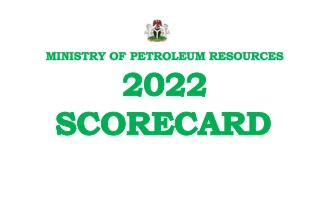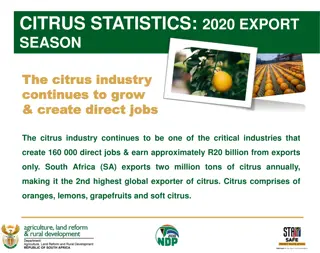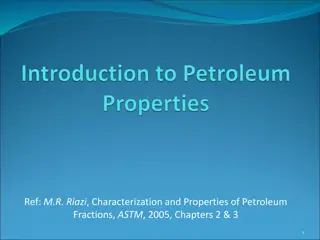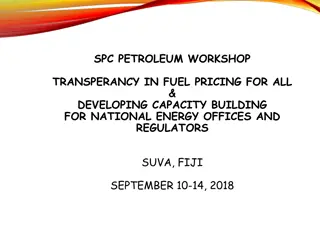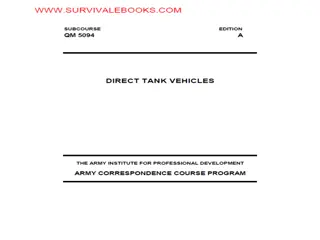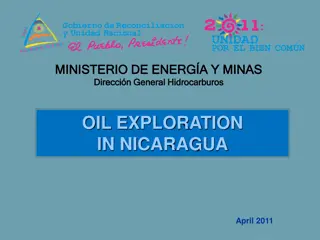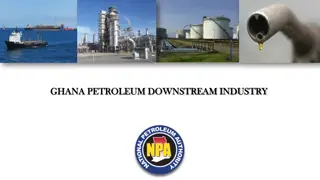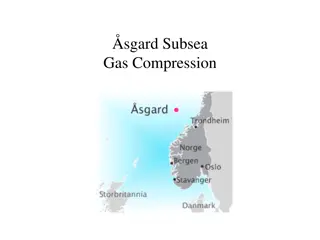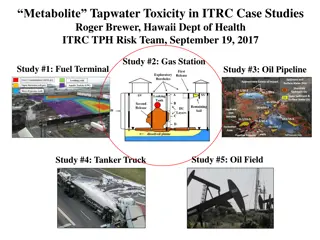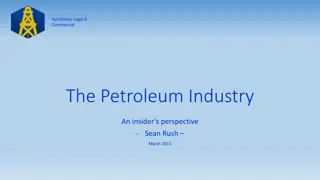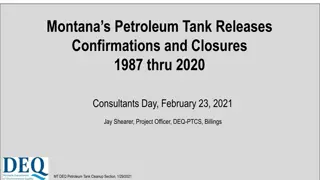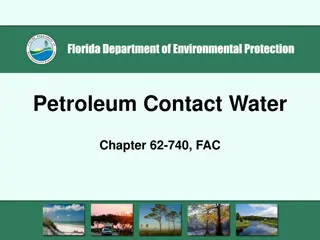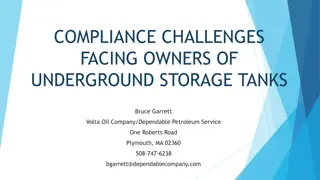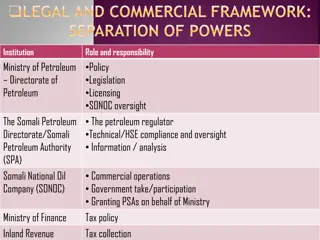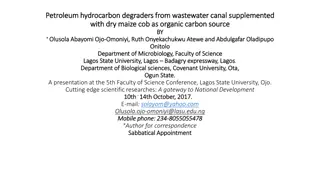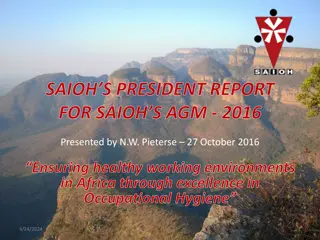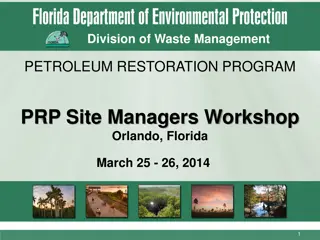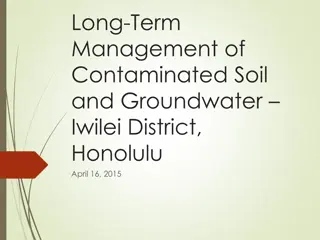Petroleum Refining Industry in South Africa: Current Overview
South Africa's economy heavily relies on petroleum, with an installed refining capacity of 520,000 barrels per day and additional Coal-to-Liquid and Gas-to-Liquid refineries. Despite challenges like operational disruptions, the sector plays a crucial role in the country's energy security and economic impact, with implications for supply security and policy considerations amidst global refinery developments.
Download Presentation

Please find below an Image/Link to download the presentation.
The content on the website is provided AS IS for your information and personal use only. It may not be sold, licensed, or shared on other websites without obtaining consent from the author. Download presentation by click this link. If you encounter any issues during the download, it is possible that the publisher has removed the file from their server.
E N D
Presentation Transcript
PRESENTATION ON THE STATE OF PETROLEUM REFINING IN SOUTH AFRICA
PRESENTATION LAYOUT Introduction Installed Refinery Capacity Description Existing Refineries Status of Operation at Refineries Global Developments Current Plans of Existing South African Refineries Implications on Security of Supply Other Socio-Economic Implications Policy Considerations Conclusion
INTRODUCTION South African economy relies heavily on Petroleum This includes Power generation. RSA is dependent on imported oil and increasingly imported Petrol and Diesel imports. No proven resource in the country except gas offshore in Southern Cape. No significant footprint of crude oil externally. Petroleum Sector employs about 110 000 People (70,000 Retail). R360 billion turnover per Annum.
REFINERY SECTOR IN SOUTH AFRICA South Africa has installed capacity of 520 000 Barrels per day of crude oil refineries. In addition there is a Coal to Liquid refinery of 150 000 Barrels per day. In addition there is a Gas to Liquid refinery with capacity to produce 45 000 Barrels per day. All Crude Oil Refineries were built in the 1950s and 1960s. The CTL and GTL Plants were built in the 1980s.
DESCRIPTION OF EXISTING REFINERIES NAME LOCATION CAPACITY OWNERSHIP ASTRON REF Cape Town 100 000 Barrels/Day Astron Energy . ENREF Durban 135 000 Barrels/Day Engen NATREF Sasolburg 110 000 Barrels/Day Sasol 64%/Total 36% SAPREF Durban 180 000 Barrels/Day BP 50%/ Shell 50% SECUNDA Secunda 150 000 Barrels/Day Sasol PetroSA Mossel Bay 45 000 Barrels/Day PetroSA
STATUS OF OPERATIONS AT REFINERIES Two Crude oil Refineries are currently not operational. Astron Refinery in Milnerton suffered a catastrophic incident which caused major damage. Engen Refinery has a major fire which caused extensive damage to the facility. The GTL facility in Mossel Bay is also not operational due to feedstock challenges. All other refineries are able to operate except when they are in maintenance @ Average 75% of nameplate Capacity.
GLOBAL DEVELOPMENTS Growing Rationalisation of Refineries Worldwide. Smaller and Older Refineries are closing or converted to Terminals. Australia, Europe and US has seen a number of closures. Refining in the Middle East and East Asia increasing. The trend is to build Mega Refineries India and China.
GLOBAL DEVELOPMENTS CONT.. Africa Accounts for 3% of Global Refining Capacity. In Nigeria, Mr Dangote built the first mega-refinery in Sub Sahara. RSA companies are already importing Refined Product from this refinery, which is a welcome development for Intra-Africa Trade. Worldwide, COVID -19 has had an impact on refinery profitability. Oil Majors are under pressure from shareholders to offload assets that contribute to Global warming. Majors adopting Net-Zero Carbon Strategies. Transition to Electric Vehicles in Europe complicates investment plans Reduced likelihood of new refineries in Europe and this will accelerate closures.
CURRENT PLANS OF EXISTING SOUTH AFRICAN REFINERS Engen has expressed a wish to repurpose the refinery into an import terminal this would mean the current processing of Crude Oil would stop. Astron Energy is still committed to the option of restarting the refinery. Shell and BP are in the process of evaluating a number of options including obtaining an owner- operator for the refining asset closure of SAPREF is not one of the options. PetroSA has plans to obtain Feedstock for the refinery. Sasol and Total have not indicated any major changes in Strategy
IMPLICATIONS ON SECURITY OF SUPPLY If not carefully managed, the closure of Refineries has longer term impacts on supply security. Other than just Petrol and Diesel, the impact of closure is on Paraffin and LPG. The 2 catastrophic incidents have to some extent demonstrated some robustness of the supply system. Continuous investment in improved performance of ports is key. New Import Terminals in Cape Town and Durban had a positive impact. Richards bay and Maputo are also key in improved Supply Security.
OTHER SOCIO-ECONOMIC IMPLICATIONS Each refinery has an average of 1000 employees who will be affected by any refinery closure Closure leads to de-industrialisation and loss of engineering expertise Closure will negatively impact on Balance of Payments Base Chemicals, Bitumen and Fuel Oil etc. have to be imported
POLICY CONSIDERATIONS The changes to mobility requirements (electrification of transport fleet) are having an impact on policy choices. The country cannot afford from a Security of Supply perspective any additional closure of refineries. Not all existing refining capacity can be saved forever but the closures must have replacement plans. Inland refineries are key to security of Supply as the bulk of Demand is inland. Repair and Restart of Astron s Milnerton Refinery is desirable. Restarting of Mossel Bay Refinery is critical for increased gas utilisation.
POLICY CONSIDERATIONS CONT.. Robust Management of Imports to keep existing refineries competitive is important what is produced locally must be placed locally. The Country must commit decisively on Natural Gas Vehicles, Electric Vehicles-entry & Hydrogen Fuel or Alternatively Build a Mega Refinery.
CONCLUSION Globally Petroleum Refining is undergoing fundamental changes and the South African refining sector is not immune. Decarbonisation is a major driving factor in strategies of Oil Majors. At least one other crude oil refinery is likely to close in RSA. One refinery may change ownership but will remain operational. Imports of refined products will increase significantly in the short to medium term. Investment in Import Infrastructure is a no regret option. All these changes must be used as opportunities to broaden local ownership of petroleum infrastructure.






